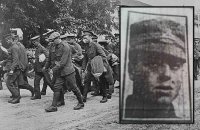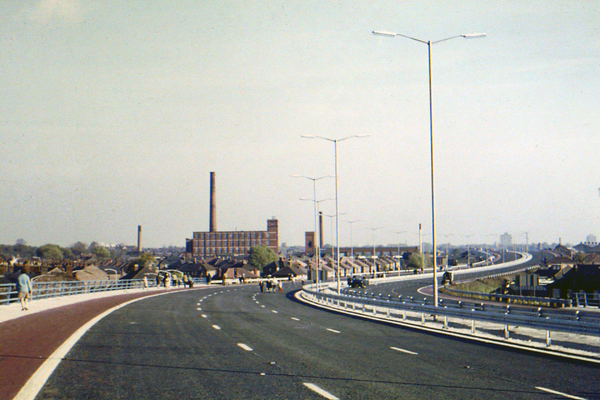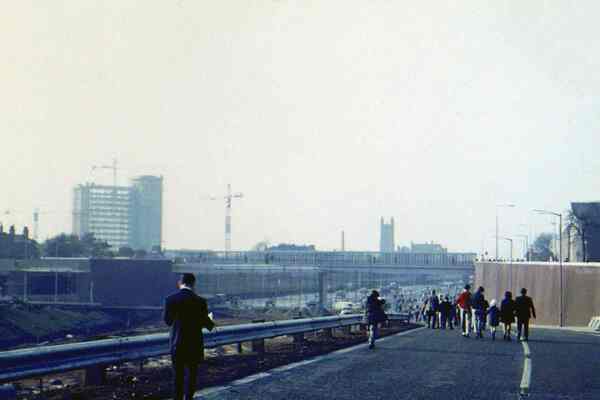
However for some, British soldiers and sailors who had been captured in combat it was a different story, many of them were forced to make the long trek home, alone and often on foot and when they returned they told the eager, waiting press, horrific stories of the inhuman and barbaric way that many of them had been treated by their captors, the Beastly Hun.
This story from the pages of the Eccles and Patricroft Journal from December, 1918 tells the story of a Clifton soldier, Lance-Corporal, Fred Williams who had been serving with the Lancashire Fusiliers but was captured in March 1918 near the village of Roisel in the Somme region of France.
The story he told the reporter is quite an extraordinary one which at time beggars belief.
Fred who was a Medical Officers Orderly was captured by the Germans and shot in the leg as he tried to escape, fortunately for him it was only a flesh wound as he would be grateful for later.
He was taken to their front line and this is where his ordeal would begin, he was made to carry a wounded German on his back for eight miles, then a further six mike march before being put in a cage along with other prisoners for the night.
The next day he was forced to march along with other prisoners, a gruelling,18 miles without food and water, and this was just the beginning.
Incredibly the next day he was marched for another 20 miles where they were given a a quarter pound of bread and a cup of coffee to sustain them before being locked up in cages for the next three days, adding that the German captors then stole all their valuables and belongings.
"Suitably refreshed" the men were marched 17 miles to a railway station to board a train to a P.O.W. camp near Munster, there were no trains and so the men slogged on for another 10 miles, that's an incredible 27 miles in one day without adequate food or water.
Eventually Fred arrived at Munster where he spent three weeks awaiting trial for possession of a firearm whilst looking after wounded soldiers, a charge he denied to no avail, but was found guilty and sent to a local mine at Saterfeld where was working alongside local woman at the bottom of the seam, digging out coal at the bottom of the shaft.
In August he was given an easier job working with the Red Cross in his P.O.W. Camp which held some 800 British, French, Belgian and Russian soldiers which sounds a far better option that working down t'pit!
Two days after the Armistice was signed Fred was told to make his way home and walked 34 miles in wooden clogs to Friedriechfeld and a military hospital, after treatment he was sent home and arrived in Hull on November 23rd.
Once safely home he told the reporter some examples of the shocking treatment meted out to prisoners by the German guards.
They were told to salute German officers and if they didn't were beaten to submission.
The most shocking story and which I find hard to believe concerns an Irish P.O.W. , described as being six feet four inches in height who refused to salute to the German's saying he would never do so, a German officer then spat in his face, which enraged the Irishman who floored the German with one punch, he was arrested and taken into their custody.
Fred then states that he was told to get an ambulance and pick up the Irishman and take him back to his hut.
He found that the man had both his arm's chopped off and his tongue cut out and had to be fed by a rubber tube, surely the man would have bled to death? propaganda or truth?
I have read stories of British P.O.W.'s being beaten and battered by the German's but never something like this.
We were then told that when the mail arrived the German's would taunt them with the letters before burning them in front of them, also when they were served fish a rare treat, ammonia would be poured into it to make it inedible.
I just don't know what to make of Fred's tale hopefully it wasn't all true, I do know that the British public were eager to read stories about how barbaric the Hun were, roasting babies on bayonets and raping nuns was a common story have read, again how true was this?
Whatever the truth Fred was looking forward to re-joining his old employers, The United Yeast Company in Manchester and hopefully live a quiet, normal life, he certainly deserved one.







Recommended Comments
There are no comments to display.
Create an account or sign in to comment
You need to be a member in order to leave a comment
Create an account
Sign up for a new account in our community. It's easy!
Register a new accountSign in
Already have an account? Sign in here.
Sign In Now